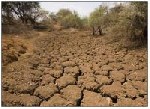 almotamar.net google science
almotamar.net google science - WASHINGTON (AP) -- Changing climate will mean increasing drought in the southwestern United States, where water already is in short supply, according to a new study."The bottom line message for the average person and also for the states and federal government is that they'd better start planning for a Southwest region in which the water resources are increasingly stretched," said Richard Seager of Columbia University's Lamont Doherty Earth Observatory.
Seager is lead author of the study published online Thursday by the journal Science.
Researchers studied 19 computer models of the climate, using data dating back to 1860 and projecting into the future. The same models were used in preparing the reports of the Intergovernmental Panel on Climate Change
The consensus of the models was that climate in the southwestern United States and parts of northern Mexico began a transition to drier conditions late in the 20th century and is continuing the trend in this century, as climate change alters the movement of storms and moisture in the atmosphere.
The reduction in rainfall could reach levels of the 1930s Dust Bowl that ranged throughout the Midwestern United States, Seager said in a telephone interview.
That does not mean there would be dust storms like those of the 1930s, Seager said, because conditions at that time were complicated by poor agricultural practices. But he said the reduction in rainfall could be equivalent to those times when thousands of farmers abandoned their parched land and moved away in search of jobs. Currently, most water in the Southwest is used in agriculture, but the urban population of the region is growing and so the water needs of people are growing as well, he explained.
"So, in a case where there is a reduced water supply, there will have to be some reallocation between the users," Seager said. "The water available is already fully allocated."
He said he feels that adjustments can be made to deal with the change, perhaps by withdrawing some land from production and by conserving water in urban areas.
"But it's something that needs to be planned for," Seager said. "It's time to start thinking how to deal with that."
Jonathan T. Overpeck, director of the Institute for the Study of Planet Earth at the University of Arizona, said the finding "agrees with what is already happening in the Southwest, and will be further complicated by the already declining spring snowpack due to warming."
"These are scary results, but scary in part because they are results of well thought-out scientific work by a large number of strong scientists," said Overpeck, who was not part of the research team
In other reports in this week's issue of Science:
• Researchers led by Alan Gange of the University of London reported that as a result of warming temperatures some species of mushrooms and toadstools in southern England have begun to fruit twice a year rather than once.
They found that some species that previously only fruited in October now also fruit in April. In addition, the length of the fruiting period has grown over time and in the last decade alone it has more than doubled, they found.
• Deep waters in the North Atlantic some 125,000 years ago were warmer than they are now and may have helped melt the Antarctic ice sheets, according to researchers led by Jean-Claude Duplessy of the Laboratory of Climate and the Environment of Institute Pierre Simon Laplace outside Paris.
Deep North Atlantic water flows south, then rises to the surface near Antarctica. The researchers said current warming climate trends indicate similar conditions to that period could occur in the next couple of centuries.
